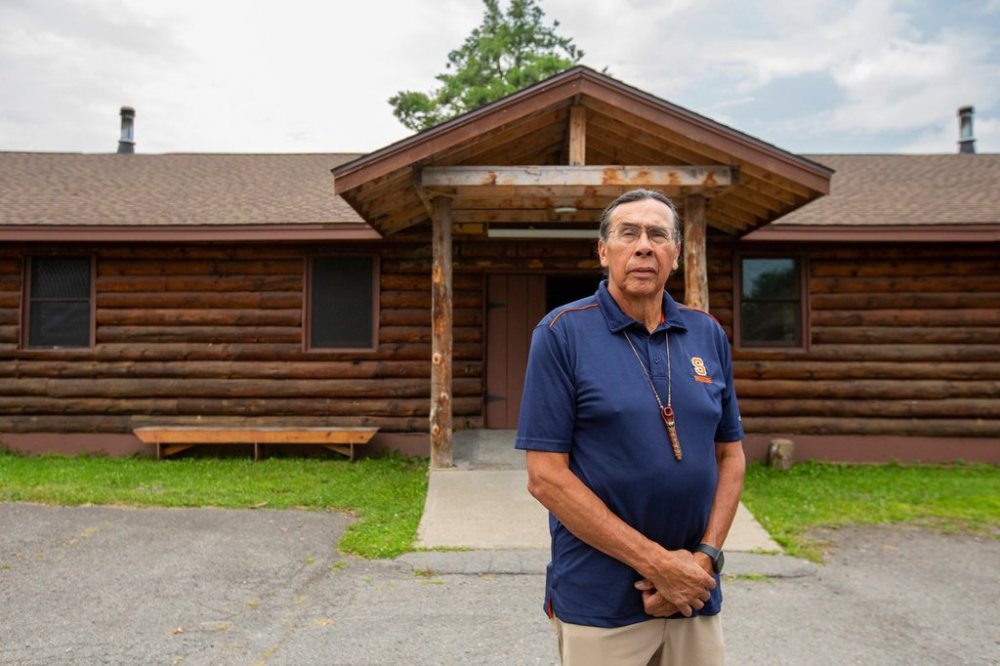World
Onondaga Nation Presses for Land Return at Polluted Onondaga Lake

Onondaga Nation members are advocating for the return of a lakeshore parcel at Onondaga Lake, a site of deep cultural significance and historical reverence. Once a pristine body of water, Onondaga Lake has faced severe pollution due to industrial activities since the 19th century. Local officials have shown interest in transferring land back to the Onondagas, but efforts have stalled over various issues, including taxes and the debate surrounding a statue of Christopher Columbus.
Before white settlers arrived, Onondaga Lake was considered sacred by the Onondaga Nation, which governed extensive territories in upstate New York and parts of Canada prior to the American Revolution. The lake holds historical importance as the location where the Peacemaker, along with Onondaga leader Hiawatha, united the warring nations of the Mohawk, Oneida, Cayuga, Seneca, and Onondaga, forming the Haudenosaunee Confederacy. This confederacy is thought to have influenced the drafters of the United States Constitution.
Efforts to reclaim land have met with numerous obstacles over the past 14 years. Recent discussions have been complicated by the ongoing cleanup of the lake, which has seen significant restoration but still warns against consuming its fish due to contamination. Sid Hill, the Tadodaho of the Onondaga Nation, emphasized the lake’s ongoing cultural relevance, stating, “We have ceremonies which need to be practiced on its shores and other obligations.”
Local lawmakers previously expressed support for returning land to the Onondaga Nation. In 2011, a nonbinding resolution aimed to transfer a parcel near a shopping mall, but the area was deemed too polluted. A subsequent resolution in 2016 supported the “eventual transfer” of a yet-to-be-determined parcel, yet progress has remained minimal since then.
The Onondaga Nation believes that local authorities are presenting challenges to hinder the process. Among these challenges is the statue of Christopher Columbus, which has stood in downtown Syracuse since 1934. The Onondagas view the statue as a symbol of colonial oppression and have supported plans proposed by the mayor of Syracuse in 2020 for its removal. Yet, the statue remains in place due to pushback from its supporters, who regard Columbus as a symbol of Italian American heritage.
The discussion around the statue has become intertwined with negotiations for the lakeshore land transfer. An aide to Ryan McMahon, the Onondaga County Executive, suggested that if the land transfer is to symbolize healing, the demands surrounding the Columbus statue may contradict that goal. The aide proposed considering a statue of Hiawatha to potentially bridge the divide between opposing viewpoints.
Betty Hill, a member of the Onondaga Nation, criticized the suggestion of placing a Hiawatha statue next to Columbus, calling it “beyond insulting.” Her husband, Sid Hill, expressed frustration over the negotiations, stating, “What do we have to trade? We don’t have anything. We have just a small piece of land left.”
McMahon clarified that he is not using the statue as a bargaining tool and emphasized the need for the Onondagas to pay taxes on other properties they have reacquired. He also seeks assurance that the nation will not pursue legal action regarding the lake’s cleanup, which has been criticized by Onondaga leaders as inadequate.
The tax situation poses a significant hurdle, as Joe Heath, an attorney representing the Onondaga Nation, noted that state law does not require taxes on land recognized as Onondaga territory in the 1794 Treaty of Canandaigua. Despite the challenges, Betty Hill affirmed their commitment to reclaiming land, stating, “We’re not going to stop in this quest to gain a piece of this back for our people and our confederacy.”
The ongoing discussions reflect not only the complexities of land rights and historical grievances but also the broader implications for Indigenous sovereignty and environmental justice in the region.
-

 Politics4 weeks ago
Politics4 weeks agoSecwepemc First Nation Seeks Aboriginal Title Over Kamloops Area
-

 World5 months ago
World5 months agoScientists Unearth Ancient Antarctic Ice to Unlock Climate Secrets
-

 Entertainment5 months ago
Entertainment5 months agoTrump and McCormick to Announce $70 Billion Energy Investments
-

 Science5 months ago
Science5 months agoFour Astronauts Return to Earth After International Space Station Mission
-

 Lifestyle5 months ago
Lifestyle5 months agoTransLink Launches Food Truck Program to Boost Revenue in Vancouver
-

 Technology3 months ago
Technology3 months agoApple Notes Enhances Functionality with Markdown Support in macOS 26
-

 Lifestyle3 months ago
Lifestyle3 months agoManitoba’s Burger Champion Shines Again Amid Dining Innovations
-

 Top Stories2 months ago
Top Stories2 months agoUrgent Update: Fatal Crash on Highway 99 Claims Life of Pitt Meadows Man
-

 Politics4 months ago
Politics4 months agoUkrainian Tennis Star Elina Svitolina Faces Death Threats Online
-

 Sports5 months ago
Sports5 months agoSearch Underway for Missing Hunter Amid Hokkaido Bear Emergency
-

 Politics5 months ago
Politics5 months agoCarney Engages First Nations Leaders at Development Law Summit
-

 Technology5 months ago
Technology5 months agoFrosthaven Launches Early Access on July 31, 2025





















